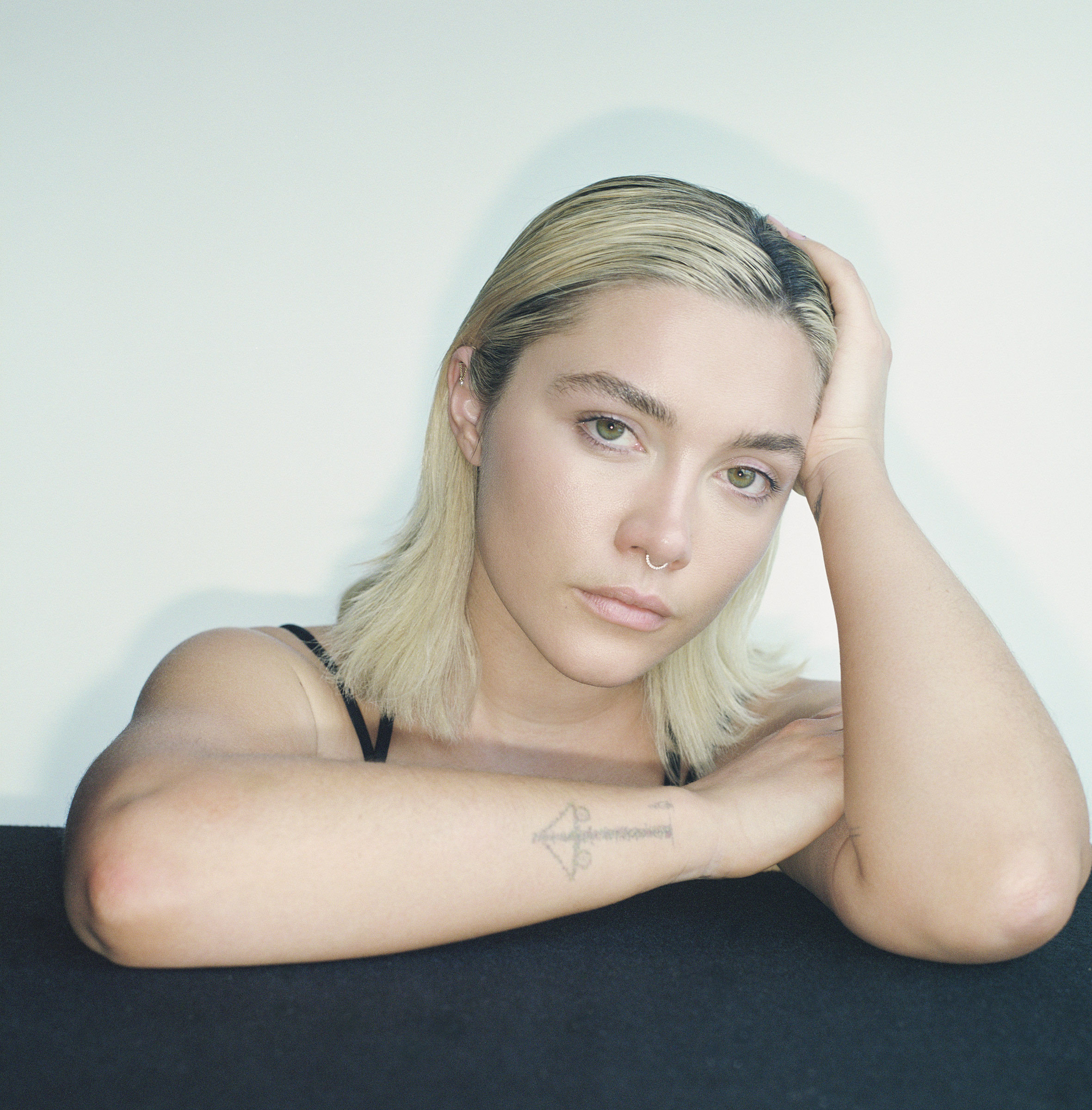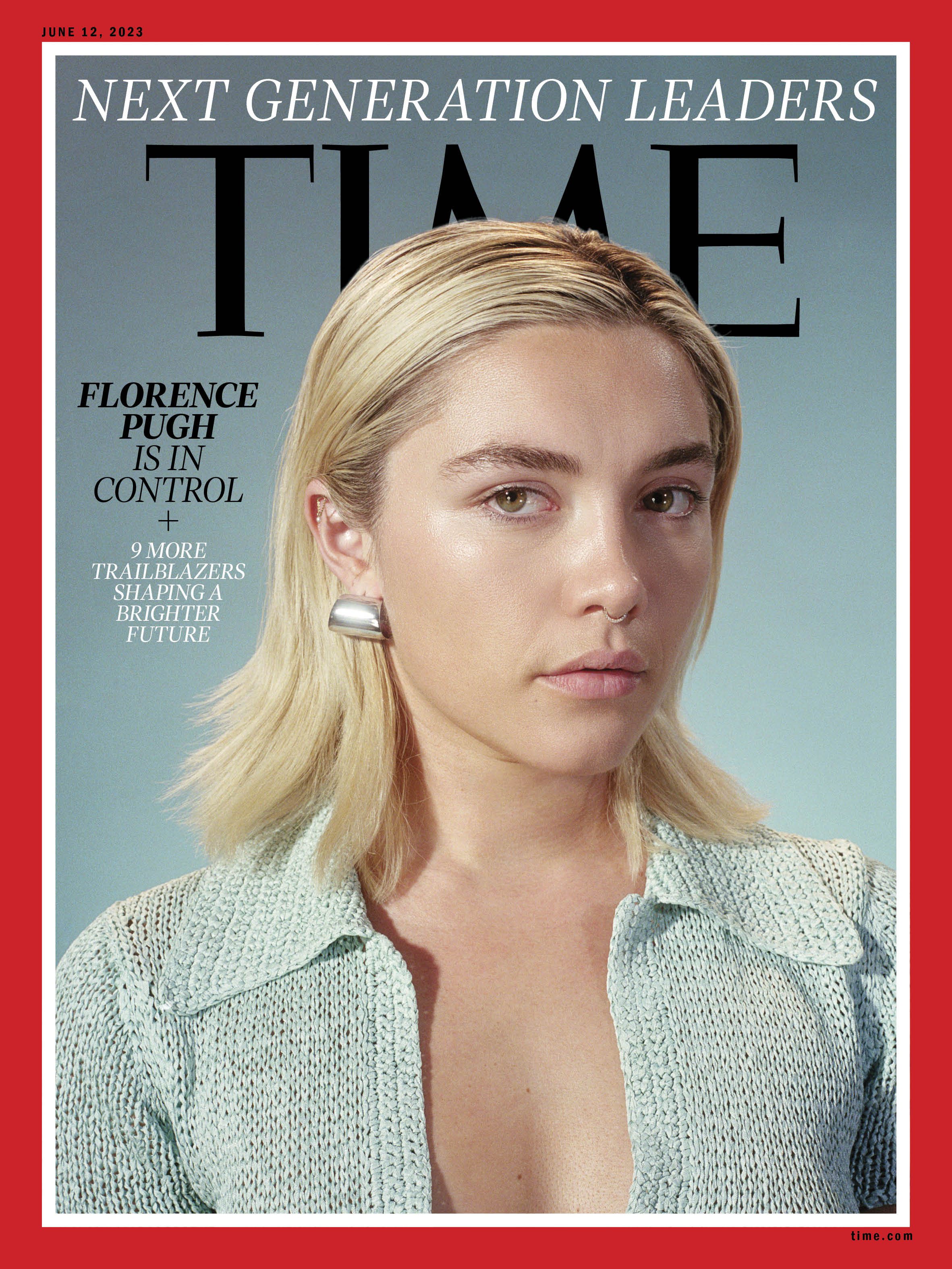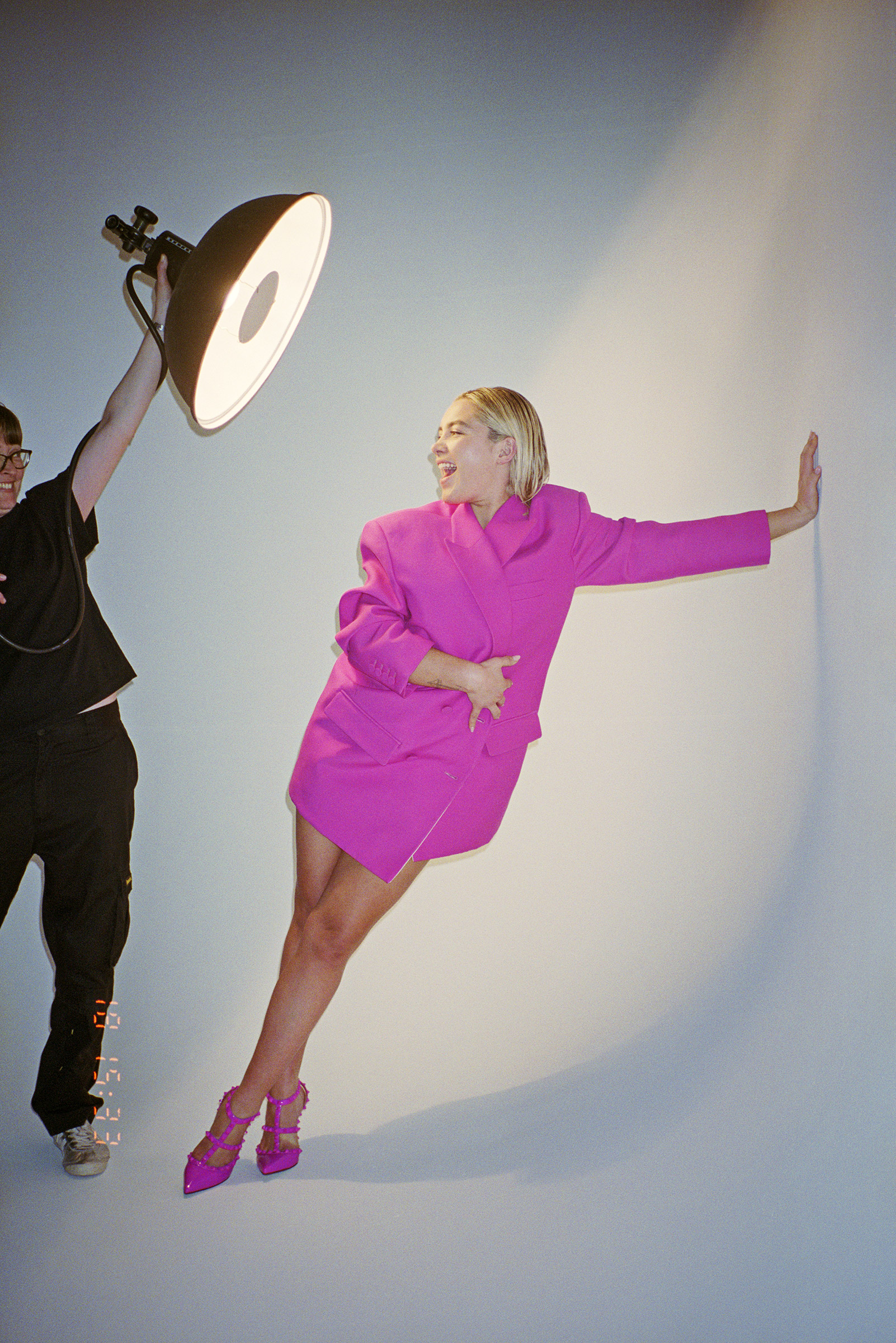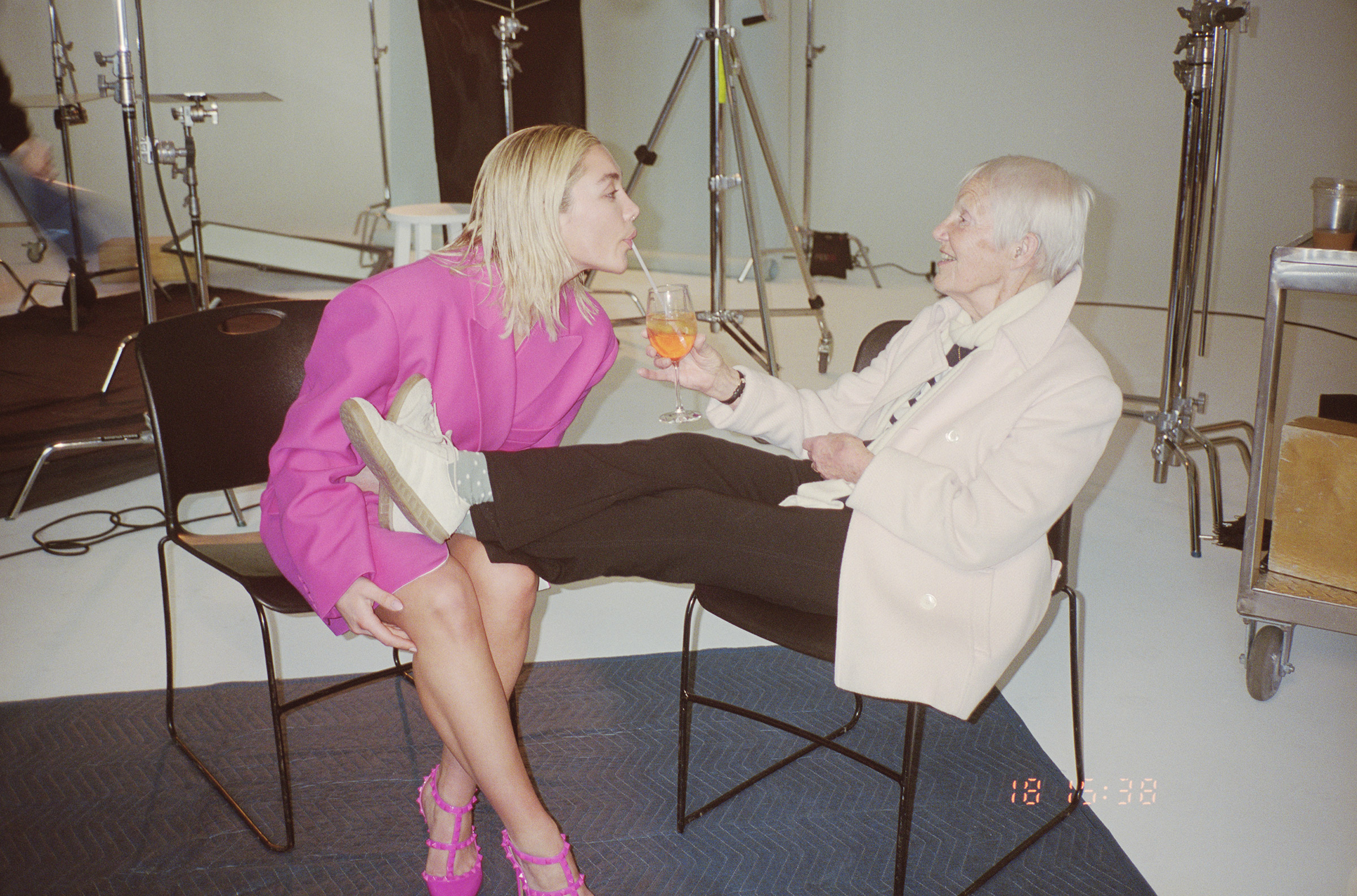When Florence Pugh was a child, she hated to cry in public. If she had an argument with her parents, she would run to the bathroom, lock the door, and sit under the sink. Only then would she weep. “When I started acting I remember thinking, ‘Ooh, this isn’t good news’ because we all know how amazing it feels when you see the character you’ve been following finally crumbles,” she says. “And I just couldn’t do it.”
Now she cries so often in movies that it’s become something of a meme—her guttural wails in Midsommar, her blubbering in Little Women, and her screams in Don’t Worry Darling have all gone viral. Because a childhood illness affected her breathing, Pugh still has a gravelly voice that lends itself to anguish. She used to imagine her family in coffins to achieve the ultimate ugly cry: “I never wanted it to be prissy. For me, it’s snot or nothing.” But she’s no one-trick pony: equally adept at comedy and action, she has appeared in superhero flicks and indies. She’s a magnetic and multifaceted onscreen presence, the kind that doesn’t come around very often.

Pugh is in the midst of what might be the biggest year of her career. On the heels of A Good Person—a drama written and directed by her ex-partner, Zach Braff, which she also produced—she’ll star in two highly anticipated movies: Christopher Nolan’s Oppenheimer and Denis Villeneuve’s Dune: Part Two. Both are the sorts of epics that Hollywood rarely makes anymore, especially in an era when franchises, not movie stars, sell tickets.
Studios and directors are fretting that the theatrical experience may die if a new crop of young stars can’t lure audiences. A recent National Research Group survey asked moviegoers to name the actors who could get them to a movie theater. The top answers all qualify for AARP cards: Tom Cruise (60), Dwayne Johnson (51), and Tom Hanks (66). Villeneuve says he cast Dune: Part Two with the future of cinema in mind. “I needed people who have the necessary charisma,” he says. “I think Florence, Zendaya, Timothée [Chalamet], and Austin [Butler], they will be the new power in Hollywood. These strong, charismatic figures will drag people back to the theater.”
Pugh has charisma to spare. Along with her famous frown, she deploys her infectious smile at opportune moments, often on the tiny screens where our social feeds scroll. She glowed in royal purple Valentino, a knowing grin on her face and Aperol spritz in her hand, as she strutted around Venice last fall the same day the director she was allegedly feuding with, Olivia Wilde, had to explain why Pugh was absent from a Don’t Worry Darling press conference. She gleefully called out trolls who scolded her for wearing a transparent dress that showed off her nipples. She beamed when she debuted a new buzz cut at the Met Gala in May.

Her smile betrays a confidence near impossible to achieve at 27. She’s honed her control of her emotions into an art for delicate scenes. “Despite her youth, she has a drive and assurance,” says Villeneuve. “You feel you’re working with someone who can absolutely go anywhere and do anything emotionally in the most subtle and precise way. She’s a raw diamond.”
Pugh and I meet at Locanda Verde, an Italian restaurant in Tribeca. The green juice she ordered keeps separating, and Pugh mindlessly stirs the concoction back together before each sip. Pugh ate here with her parents the night before and requested a table in the corner. The waiter solemnly informed her that that spot was reserved for Robert De Niro, a co-owner. She kept an eager eye out for the megastar all night.
People speak of legends like De Niro in hushed tones. But Pugh argues we need to let go of the concept of the enigmatic movie star: With rare exceptions like Beyoncé, public figures today simply cannot maintain an air of mystery. Luckily Pugh is particularly adept at social media. She started her career posting videos to YouTube singing and playing guitar in her childhood bedroom in Oxford. Success has changed little about her approach.
In the cheeky “Cooking With Flo” Instagram videos that rose to popularity during quarantine, Pugh offered tips gleaned from her restaurateur father. She is designing her kitchen in her new London home with more cooking videos—and even a possible TV series—in mind. “Conversations are happening,” she says of a cooking show. “If I were to make something, I wouldn’t want it to be polished or clean or fussy.”

Her entire image is messy by design. She posts as many photos of sprouting zits as red carpets. Followers might assume this is a bid for relatability. But she’s trying to maintain control of her image in a tabloid landscape that glorifies actors’ movie-premiere glamour one day and mocks their bad hair day the next. “I would never show one side of me because that’s setting myself up to fail,” she says. “I don’t want anyone to make money catching me out being me. I want to give them all of me.”
Read More: Florence Pugh Is on the 2021 TIME100 Next List
Pugh learned early the value of defining your own public persona. After her film debut in the 2014 drama The Falling, she landed a pilot for a show that never went forward—a blessing considering producers asked her to change her body. She refused and decided she would not return to Hollywood until she had a better grasp of what she wanted to represent. After a breakout role as the dastardly protagonist in the British period drama Lady Macbeth, she was drawn back to Los Angeles to play opposite Dwayne Johnson in the WWE film Fighting With My Family.
“The person I came back to was a female wrestler with muscles and big thighs who made her own name as a champion,” she says. “I quite liked that because the last time I’d been there I was told I needed to lose weight—it was just so not the person I wanted to be.” Pugh has worked with lauded directors like Park Chan-wook (The Little Drummer Girl), Greta Gerwig (Little Women), and Ari Aster (Midsommar) portraying strong-willed women who fight against society’s expectations.
“Even if they’re not defined on the page, I always find some way to make them quite confrontational,” she says of her characters. “I never see the bad in them—even when they have killed children and burned boyfriends. I’ve always understood them as people that needed to do what they had to do to survive.”
If Pugh knows when to fight, she also intuits when to stay mum. Rumors swirled in 2022 about drama on the set of Don’t Worry Darling, the film directed by Wilde—particularly regarding how Wilde’s then rumored relationship with Pugh’s co-star Harry Styles and casting decisions were causing tension. Pugh seemed to float above the controversy. Buried in the tepid reviews of the film were raves for Pugh’s empathetic take on a woman trapped in a ’50s male fantasy. Despite the fervent gossip—or because of it—Don’t Worry Darling made almost $90 million at the box office, a feat for an adult drama.
Pugh is building a career on films that run the gamut from scrappy indie shoots to mega blockbuster productions. No matter the scope, after nearly a decade in the business, Pugh can sense whether a film will succeed based on vibes alone. Has she ever thought, while on set, that a movie was simply falling apart? “Definitely,” she says. “A whole film set, it’s everybody making a huge effort because they want to be there. And if someone doesn’t want to be there or if someone isn’t pulling their weight, you can feel it. The film feels wrong.” I start to press for specifics and she—exceedingly politely—moves on to a related topic.

Recent experiences on gigantic projects with Nolan and Villeneuve set a high bar. “He has the utmost respect for every single person working on that set,” she says of Nolan. And she calls Villeneuve a “bizarre, mad, creative genius” for his ability to render the fantastical world of Dune onscreen.
Villeneuve, in turn, describes Pugh as a rambunctious kid: “She’s mischievous.” Pugh confirms that she and Chalamet, who starred in Little Women together, had to be separated in the Dune trailer because they were having too much fun. But don’t let her playfulness deceive you, Villeneuve warns. Once the cameras roll, “she has firepower.” Her peers and fans agree: she’s earned nods from the Oscars, BAFTAs, and the Cannes Film Festival, and effusive support from 9.1 million Instagram followers.
Actors who enter the Superhero Industrial Complex can end up trapped in an endless series of interconnected films and shows. After her debut as Black Widow’s sister Yelena in 2021’s Black Widow, Pugh made a cameo in the Disney+ show Hawkeye and is scheduled to begin shooting a Marvel ensemble movie Thunderbolts with Harrison Ford this summer. But in between, she managed to earn a slew of nominations for her small Netflix film The Wonder.
Read More: Black Widow Is a Showcase for Florence Pugh and Scarlett Johansson
“So many people in the indie film world were really pissed off at me. They were like, ‘Great, now she’s gone forever,’” she says. “And I’m like, no, I’m working as hard as I used to work. I’ve always done back-to-back movies. It’s just people are watching them now. You just have to be a bit more organized with your schedule.”
Her future will, she hopes, involve time on the stage. She wrote and performed music in A Good Person and wants to sing again. She’s working on an love story produced by A24 opposite Andrew Garfield called We Live in Time. She is open to a rom-com—and if anyone can help bring back a genre on life support, it’s an actor disproving the thesis that movie stars are a dying breed.
We finish our breakfast, leaving behind the half-drunk glass of green juice. Pugh heads to a photo shoot where she finds a more appetizing drink, another Aperol spritz. A couple hours later, her parents, grandmother, and Braff pop by for a visit, and Pugh beckons her Gran—who has recently joined her on several red carpets—to sit beside her. The actor plucks two straws from a cup and sticks them in the spritz so the duo can sip it together. Pugh laughs and applauds as her grandmother dramatically curtsies for the crew. All smiles, no tears.
Styling by Sasha Kelly; Hair by David Von Cannon; Make-up by Alex Babsky
- How Nayib Bukele’s ‘Iron Fist’ Has Transformed El Salvador
- What Makes a Friendship Last Forever?
- How to Read Political Polls Like a Pro
- Long COVID Looks Different in Kids
- What a $129 Frying Pan Says About America’s Eating Habits
- How ‘Friendshoring’ Made Southeast Asia Pivotal to the AI Revolution
- Column: Your Cynicism Isn’t Helping Anybody
- The 32 Most Anticipated Books of Fall 2024